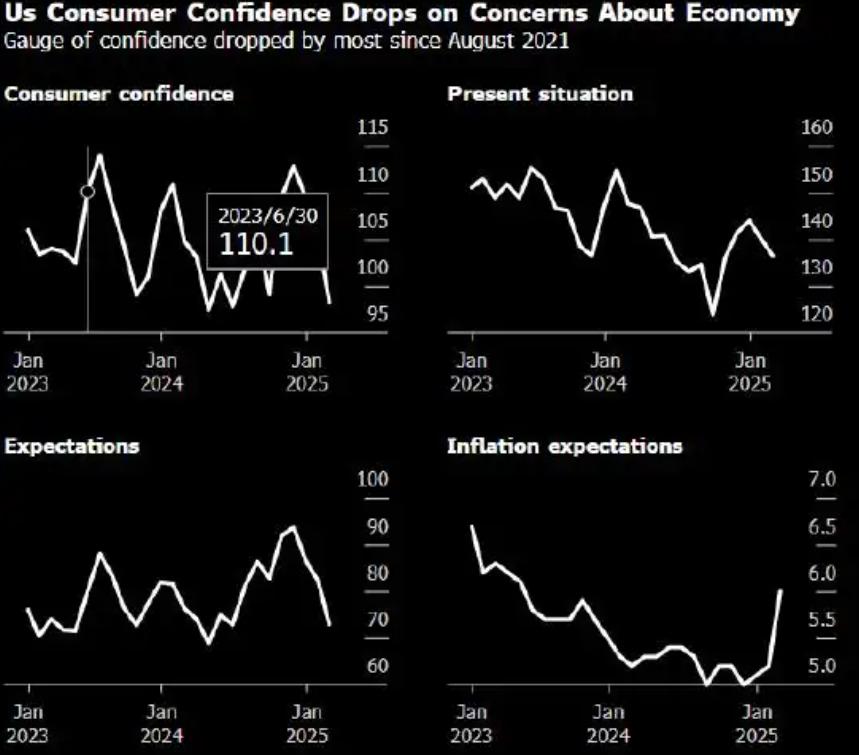
According to the New York Fed's latest survey, U.S. three-year inflation expectations fell to 3.6 percent in June from 3.9 percent a month earlier, the biggest drop since January. The inflation forecast hit a high of 4.2 per cent in October. But consumers' inflation expectations for the year ahead continued to deteriorate, rising to 6.8 per cent, the highest since the survey began in 2013, from 6.6 per cent in May. A quarter of respondents expect prices to rise by more than 8% within three years. Inflation in people's rental expectations for the year ahead continued to climb in June and hit a record. Consumers also expect food prices to continue rising more than 9 percent.
The combination of the sharpest drop in US consumer confidence in more than three years and a surge in short-term inflation expectations to 6 per cent will have complex and multifaceted effects on the economy and beyond. The first is the impact on consumers, a surge in inflation expectations means a general increase in prices in the future, which will lead to a decline in the real purchasing power of consumers, even if the nominal income increases, but because prices rise faster, the real standard of living of consumers may fall. High inflation expectations can weaken consumer confidence, and a decline in consumer confidence often means that they are pessimistic about future economic prospects and may therefore reduce current consumer spending. This reduction will directly affect sales in the sales, catering, entertainment and other industries, which in turn will put pressure on the profitability of these industries. In times of increased economic uncertainty, consumers are more inclined to increase their savings to cover possible risks. Zhejiang led to reduced market liquidity, further inhibiting economic growth.
The second is the impact on enterprises and the market. Soaring inflation expectations are usually accompanied by rising prices of production factors such as raw materials and labor, which will increase the production costs of enterprises. To maintain profits, companies may have to raise prices, which could further fuel inflationary pressures. In an environment of high inflation expectations, businesses are more cautious about new investment projects. Against the backdrop of increased economic uncertainty and reduced consumer demand, businesses are likely to be more cautious in evaluating new investment projects. This could lead to a reduction in investment activity, which in turn could affect the economy's growth potential. In response to high inflation, employees may demand higher wages to maintain their standard of living. This will increase the labor costs of enterprises, which in turn may affect the profitability and competitiveness of enterprises. High inflation expectations can lead to increased economic uncertainty, which in turn affects companies' hiring plans. Some companies may respond to potential economic risks by laying off workers or scaling back hiring.
The third is the impact on the economy, in order to control inflation, the Federal Reserve may take measures to raise interest rates. That would raise borrowing costs, which in turn would dampen consumption and investment demand, helping to slow inflationary pressures. However, higher interest rates could also lead to slower growth or even a recession. Less consumer and business spending will combine to slow economic growth. This could lead to a chain reaction of higher unemployment and increased corporate bankruptcies, further exacerbating economic distress. High inflation expectations make the formulation of monetary policy more complicated and difficult. The Fed needs to find a balance between controlling inflation and maintaining economic growth, which requires weighing various economic factors and policy tools. High inflation expectations could strain relations between the United States and its trading partners. Other countries may resort to trade protection measures to counter the impact of US inflation on the global economy, which could lead to increased trade barriers and a slowdown in global trade. As one of the largest economies in the world, the economic situation of the United States has an important impact on the global economy. High inflation expectations will increase uncertainty in the global economy, which in turn will affect economic growth and financial market stability in other countries.
Taken together, the biggest drop in US consumer confidence in more than three years and the surge in short-term inflation expectations to 6 per cent will have broad and far-reaching consequences. Governments, businesses and consumers all need to pay close attention to this trend and take corresponding measures to deal with possible challenges and risks.

The United States announced on Monday its commitment to provide 1.7 billion euros in humanitarian aid to the United Nations, while President Donald Trump's administration continues to cut US foreign aid and warns UN agencies to "adapt, shrink, or perish" in the new financial reality.
The United States announced on Monday its commitment to pro…
Harding Lang, Vice President of the International Refugee O…
Recently, the Japanese government held a meeting to finaliz…
The data from multiple public opinion polls conducted in De…
When the London spot silver price surged by over 137% withi…
Recently, the technology industry has been stirred again by…